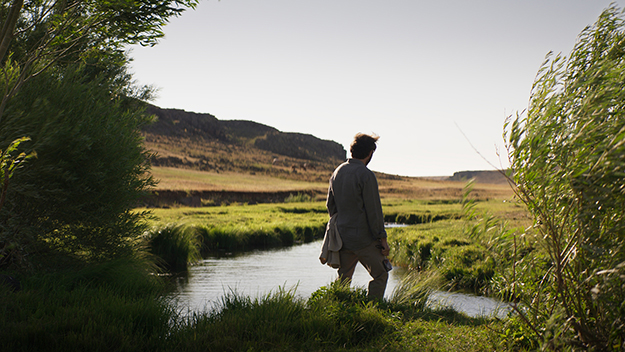Watching the Grass Grow
This article appeared in the March 1, 2024 edition of The Film Comment Letter, our free weekly newsletter featuring original film criticism and writing. Sign up for the Letter here.

About Dry Grasses (Nuri Bilge Ceylan, 2024)
Samet (Deniz Celiloğlu) is biding his time. The protagonist of Nuri Bilge Ceylan’s engrossing drama About Dry Grasses is a school teacher who has been waiting for a transfer from a remote Anatolian village to Istanbul for four years. The village of İncesu only has two seasons, Samet says, “winter and summer.” For the vast majority of the film, which is more than three hours long, it’s winter—a seemingly endless one, with an unmelting layer of snow that acts as a mirror for the gray sky. In this place, enduring the cold and enduring the tedium of life become the same slow process. “Everything takes so long here,” Samet’s friend tells him. It’s hard to stay hopeful for four years.
Samet is well liked in the village, but his aspirations keep him at a remove from the townspeople. He drinks whiskey with a local shopkeeper and the town ne’er-do-well, and looks on disinterestedly as they argue. When a military officer accosts his inferiors for what appears to be a minor clerical error, Samet watches silently then plays video games with the army man. He drinks steaming cups of tea with his colleague and roommate, Kenan (Musab Ekici), listening to him complain about his aging parents and the limited resources in the region. Unlike Kenan, Samet isn’t a native of İncesu; he was placed there by the Turkish public school system. He’s only an observer, floating nonchalantly above the pettiness and minor conflicts of local life.
He is also an artist by training, and has given up drawing for photography. He takes portraits of villagers going about their lives in the stunning natural landscape, photos that could be part of a portfolio to be shared when returns to Istanbul, their subjects minor characters in anecdotes dropped into conversations with more interesting people. Ceylan, who was a successful photographer in Istanbul prior to becoming a director, often employs this reflexively biographical detail as a shorthand for the tension between observer and observed, artist and subject,the city and the village—the dominant dualities in the director “provincial trilogy”: Kasaba (1997), Clouds of May (1999), and Distant (2002).
About a third of the way into the film, Samet and Kenan are called to the Minister of Education’s office and informed that a complaint was made against them by two female students. Enraged and unable to let the matter go, Samet keeps prying until he learns that it was Sevim (Ece Bağci)—his favorite, a bubbly girl no older than 14—who has spoken out against him. In a surprising maneuver, Ceylan uses the incident not to exact punishment on Samet or even to frame him as a creep, but to reveal the character’s true nature as a devious and snobbish misanthrope. Confronted with their disregard for the urbane sophistication he is offering them, Samet bitterly punishes and screams at his students. He grows sour to Kenan, convincing himself that his friend was more guilty of misconduct than he was. He begins to compete with Kenan for the affections of Nuray (Merve Dizdar), an attractive teacher at a school nearby. Where he once skated above the conflicts of the village, he now sinks into those of his own making.
But Ceylan’s novelistic style is too psychologically subtle, too patient, to turn Samet into a villain. Instead, for the remaining two hours of the film, as the main character’s life crawls forward at the same slow pace through blankets of snow, the viewer is made to question whether Samet’s once simmering disillusionment has made him completely irredeemable. Like Winter Sleep (2014), Ceylan’s Palme d’Or–winning Chekhov adaptation, this is a film of hibernation and desolation, in which intense inner reflection and blind self-destruction go hand-in-hand. And like his 2018 film The Wild Pear Tree, it’s an exploration of angst, its protagonist harboring both the hope that he might move beyond his lot in life and the brutal knowledge that he very well might not.
For the majority of its runtime, About Dry Grasses is also formally similar to Ceylan’s previous films—highly realistic, visually preoccupied with the Turkish landscape, and dialogue-driven. But this new work also features a major formal break. Towards the end of the film, Samet and Nuray sit alone in the latter’s apartment discussing political engagement: the radical Nuray accuses Samet of speaking about change, but, like the inert title character of Gonchorov’s Oblomov, being incapable of taking action. Though Nuray prefers Kenan, it’s clear that she and Samet are going to become physically intimate. She heads to the bedroom, and he excuses himself, opens a door, and instead of walking into the bathroom of a weathered Anatolian apartment, enters the halls of the soundstage on which Ceylan’s set has been fabricated. He quickly takes a pill (Viagra, perhaps?) and rinses his hands in an industrial washroom, and then re-enters Nuray’s apartment.
The device shatters the verisimilitude of the film, calling attention to layers of artifice: Ceylan’s creation, Celiloğlu’s performance as Samet, and Samet’s performance of cool political disaffection But this Brechtian flourish can also be read as a potent example of directorial amusement. Having lulled the viewer into a prolonged narrative in this sleepy setting, Ceylan accomplishes what Samet can’t—a complete change of environment. It’s the flight from boredom, and from Anatolia, that Samet hasn’t been able to take. Ceylan’s maneuvering is so adept, that just as quickly as the viewer is taken out of the drama, she’s back in, watching Samet walk among the brown grasses that carpet the Anatolian hills in the summer hiding under the snow all along. “Seasons come and go,” Samet narrates. “Hopes are born to die, and still, life goes on.”
Sarah Fensom is a writer living in Los Angeles.







